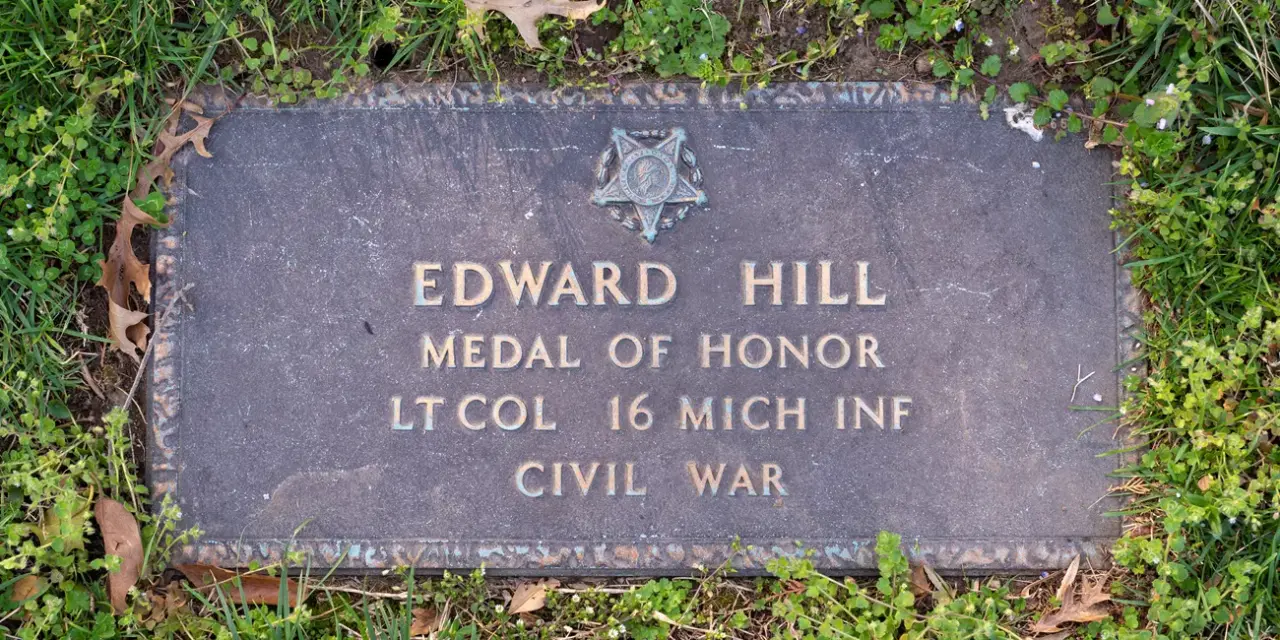Back in June 2023, I wrote about the name change at Ft. Bragg in North Carolina which had just become Ft. Liberty. It took a few years for the plan to come to fruition. It began in 2020, when language was entered into the National Defense Authorization Act for 2021 creating a “Commission on the Naming of Items of the Department of Defense that Commemorate the Confederate States of America or Any Person Who Served Voluntarily with the Confederate States of America.” Ft. Bragg qualified because it was named after Confederate General Braxton Bragg.
President Trump vetoed the entire defense bill over this provision, but in December 2020, his veto was overridden in the House by a 322-to-87 vote. The Senate followed on New Year’s Day, 2021, voting 81-13 to override Trump’s veto. Five days later, Trump started his own violent insurrection.
The Commission deliberated for a couple years, but in 2022 it delivered its name-changing recommendations for “bases, posts, ships, streets and more named after Confederate soldiers,” and in 2023 the Department of Defense began implementing their plan. Nine military bases, including Ft. Bragg, were renamed.
At the time, Mike Pence and Ron DeSantis, who were both running for president, promised to undo the name changes in speeches before the North Carolina Republican Party. Trump had already made his position known. On Tuesday, he acted:
President Trump, during a speech at Fort Bragg, N.C., said on Tuesday that he would restore the names of all Army bases that were named for Confederate generals but were ordered changed by Congress in the waning days of his first administration.
As I noted back in 2023, it was never a great idea to commemorate the career of Braxton Bragg.
The obvious issue is that Braxton Bragg “betrayed his country.” A secondary consideration is that he is broadly believed to have been a shitty general. I don’t think we should honor traitors, obviously, but nor should we honor shitty generals…The correct thing to do is to name stuff after people whose example we want to honor and emulate.
But I’m going to let you in on a little secret. Trump is restoring the name Ft. Bragg but it now will commemorate a different Bragg: “Pvt. Roland L. Bragg, a previously obscure infantryman who had served at Fort Bragg and fought in the Battle of the Bulge during World War II.”
This pattern will be followed at the other eight bases. Here are some examples:
Pete Hegseth, the defense secretary, announced a similar name change shortly after that appeared intended to sidestep the law banning the honoring of Confederates: Fort Moore — renamed in 2023 for Lt. Gen. Harold G. Moore and his wife, Julia — would again be called Fort Benning. Instead of honoring Henry L. Benning, a Confederate and white supremacist, the base would be named for Cpl. Fred G. Benning, who served during World War I.
Another name change by the Army on Tuesday appeared particularly tortured to fit the old name while still ostensibly honoring different soldiers: Fort Walker, named for the Civil War surgeon, would be renamed again to Fort A.P. Hill. That base was originally named to honor Ambrose Powell Hill, a Confederate officer who was killed late in the war. The Army said on Tuesday that the base would be renamed “Fort Anderson-Pinn-Hill” to honor Lt. Col. Edward Hill, First Sgt. Robert A. Pinn and Pvt. Bruce Anderson who fought for the United States during the Civil War.
I note that New York Times reporter, Chris Cameron, writes that this “appeared intended to sidestep the law banning the honoring of Confederates.” I’d like to see anyone make an argument in court that this is only an apparent skirting of the law. It’s a blatant and obvious skirting of the law, and it should declared a criminal act by the lowest judge all the way up to the Supreme Court.
But the fact that Trump’s actions are illegal is just the starting point. There’s also the question of why leading Republicans, including Mike Pence and Ron DeSantis, are so keen to continue honoring members of the Confederacy.
I think someone should ask them about Lt. Col. Edward Hill. He was a member of the 16th Michigan Infantry. At the Battle of Cold Harbor, he “led the brigade skirmish line in a desperate charge on the enemy’s masked batteries to the muzzles of the guns, where he was severely wounded.” For his valor, he was awarded the Congressional Medal of Honor in 1893.
If Trump gets his way, this Union officer will be forever honored at Fort A.P. Hill, named after General Ambrose Powell Hill Jr., who commanded the opposing Third Corps of the Army of Northern Virginia at Cold Harbor.
Fortunately for posterity, Lt. Col. Hill kept a diary which includes entries on what happened to him during the battle.
Captain Hill’s job in leading his men was to “press the enemy and draw their fire” to determine their strength and hidden artillery positions. The Michigan men drove the Rebel skirmishers back, captured two lines of their rifle pits, and resisted a fierce counterattack after being resupplied with ammunition. It was an exhausting day of fighting, costing the regiment at least thirteen wounded. One of the casualties was Captain Hill, who described the day’s events succinctly in his diary: “I had charge of the Picket line on the left. This morning the 16 ordered to advance, carried the enemies rifle Pitts and advanced to the brow of the Hill, when I was shot in the right thigh.”
Hill referred to the bullet’s entry point as his right thigh, but it was somewhat higher up on his hip; medical reports later referred to it as a “gunshot wound of right ilium,” or pelvic bone. The wounded captain was placed on a stretcher and taken to a makeshift field hospital, where he was examined and, according to Private Jack Wood, “left to die.” Wood was sent to gather Hill’s personal effects and take them to regimental headquarters to be returned to his family. The view that Hill was dying was so widespread that Captain Salter of the Sixteenth reported it in a letter to a friend: “Our Regt lost this day Capt Hill mortally wounded.” Captain Hill’s closing words in his diary made it appear he was of the same opinion. Believing it would be his last entry, Hill recalled his beloved Shakespeare. His entry, “Alas poor Yorick,” refers to the churchyard scene in Hamlet where a gravedigger exhumes the skull of a deceased court jester and Hamlet voices a meditation about the fleeting vanity of life on earth.
Still breathing the next day, Hill knew that his physician expected him to die: “Suffered terribly from my operation yesterday the ball having passed through the flesh of the hip going also entirely through the Ilium bone from this point the surgeon has been unable to trace it but I know what he thinks. He thinks that it has passed into the bowels and that I will die.”
Hill did not die, but he suffered terribly.
To his own surprise and his doctor’s as well, Captain Hill did not die of his rifle wound. His journal continues after Cold Harbor and is filled with updates on his condition. At the field hospital, Hill’s friend Jack Wood of the Sixteenth administered “stimulants”—probably whiskey—to dull the pain and arranged for an army wagon to take Hill to White House Landing on the Pamunkey River. Hill suffered excruciating pain on the wagon journey to the wharf at White House, where Wood placed him on a steamer bound for Washington. His prospects improved once he arrived at Armory Square Hospital on the National Mall. There he rested comfortably and Dr. Willard Bliss, the Michigan surgeon in charge, decided not to risk probing his wound but simply to let it heal.
Some of Hill’s nights were “wretched” and fearful, but his improvement was obvious. The diary chronicled his steps toward mobility. “Feel better to day,” he wrote on June 20, when Jack (probably still Jack Wood) “wheeled me about the floor a little for the first [time].” The next day he “went out for the first time . . . in the Hospital chair.”
…Hill suffered from his wound at Cold Harbor for the rest of his life, and his disability worsened as he aged. In his pension records the examining physicians testify that the bullet had lodged in the ileum, the lower part of Hill’s small intestine, and that the injury rendered him partially incontinent and “unable to stand on his feet without support and then with difficulty.” In 1890 Hill described his disability as “increasing for the last ten years I have been unable to be without the constant aid and attendance of another person am unable to dress or undress or attend the calls of nature alone. I cannot control my bowels and in consequence am compelled to lead a life of seclusion.”
Hill died in 1900, in Green Bay, Wisconsin. Forty-one years later, Fort. A.P. Hill was established in Bowling Green, Virginia, about 35 miles north of where Edward Hill received his injuries while fighting to preserve the Union.
I can think of no greater disrespect than pretending this base is named after him when everyone knows it’s named after the general whose forces maimed him horribly for the remainder of his life. Hill suffered for 35 years. And now his memory is supposed to suffer in perpetuity.
Is this okay with Pence and DeSantis? Is it okay with anyone with a conscience?








Just as an observation, the Abrahamic religions have rooted, flourished, and prospered for thousands of years, in spite if the fact there is no actual evidence for nearly any of their foundational claims. Apparently veracity has little to do with what people want to believe is true, so I completely understand why it is so easy for people to ignore things like this. No one I know, the vast majority of whom are conservative Republicans, give a shit about stuff like this. I guess that probably 99% of them have no clue about it at all. This kind of stuff is minutiae that’s lost in the white noise of their daily lives. It certainly isn’t some sort of deal breaker that is going to cost any Republican politician a bit of concern come election time. Yes, for anyone who givcs a shit about accurate portrayals of our history and honest representations within the context of events, this kind of information matters. Sadly, however, those of us who care about such things are a rapidly shrinking minority here in the U.S. The war against intellectual thought currently underway will make certain that things like this are buried so deeply in the memory hole that it is never brought up in any sort of national discourse.